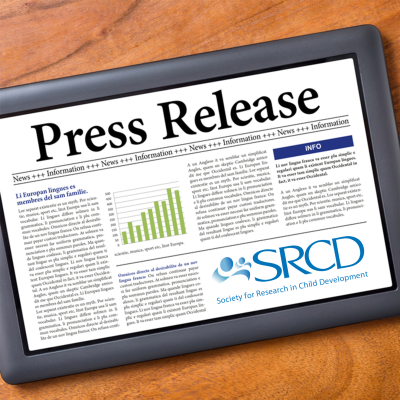Study: Children Born to Older Parents Tend to Have Fewer Behavior Problems
PRESS RELEASE / CHILD DEVELOPMENT: Embargoed for Release on July 31, 2019
Since 1995, parents in many Organisation for Economic Cooperation and Development countries and in the United States have been having their first babies at a later age. Amid this trend in delayed childbearing, a new Dutch study considered the behavior problems of children born to older parents. Specifically, researchers looked at externalizing behaviors (e.g., aggression) and internalizing behaviors (e.g., anxiety, depression) of children born to older parents when the youth were 10 to 12 years old. They found that children of older parents tend to have fewer externalizing behavior problems than children of younger parents. The researchers also found that parents’ age was unrelated to children’s internalizing behaviors.
The study was done by researchers at Utrecht University, Vrije Universiteit Amsterdam, Erasmus Medical Center, and University Medical Center Groningen. It appears in Child Development, a journal of the Society for Research in Child Development.
“Evidence points to an association between fathers’ age and autism spectrum disorders and schizophrenia, so we wanted to know if there is an association in the general population between parents’ age and common behavior problems in children, beyond the clinical diagnoses,” says Marielle Zondervan-Zwijnenburg, a postdoctoral researcher in methodology and statistics at Utrecht University, who led the study. “With respect to common behavior problems, we found no reason for future parents to worry about a harmful effect of having a child at an older age.”
Researchers analyzed the problem behavior of 32,892 Dutch children when they were 10 to 12 years old. Problem behavior was rated by fathers, mothers, teachers, and the children themselves through a series of standardized instruments.
The children, all of whom were born after 1980, were part of four studies—Generation R, the Netherlands Twin Register, the Research on Adolescent Development and Relationships-Young Cohort (RADAR-Y), and the Tracking Adolescents’ Individual Lives Survey. The children represented the entire Dutch geographic region across all strata of society and a range of socioeconomic statuses.
In the Generation R study, mothers’ age at child’s birth ranged from 16 to 46 and fathers’ age at child’s birth ranged from 17 to 68. In the Netherlands Twin Register, mothers’ age at child’s birth ranged from 17 to 47 and fathers’ from 18 to 63. In the RADAR-Y study, mothers’ age at child’s birth ranged from 17 to 48 and fathers’ from 20 to 52. And in the Tracking Adolescents’ Individual Lives Survey, mothers’ age at child’s birth ranged from 16 to 44 and fathers’ from 18 to 52.
The study found that the children of older parents had fewer externalizing behavior problems, as reported by the parents. The findings of fewer externalizing behavior problems persisted—as reported by parents and teachers—even after considering the families’ socioeconomic status, so the researchers concluded that the favorable effect of parents’ age on children’s behavior was not solely due to their income level. The study also found that parents’ age appeared unrelated to children’s internalizing behavior problems.
The study’s authors note that they focused only on children’s externalizing and internalizing behavior problems, so the findings cannot be generalized to other behaviors—though they are extending their research to cognition and attention problems. In addition, the researchers assessed children’s behavior problems during early adolescence; they plan to extend their work to other points in development.
“It’s possible that some of the reason why older parents have children with fewer problems like aggression is that older parents have more resources and higher levels of education,” explains Dorret Boomsma, professor of biological psychology and behavior genetics at Vrije Universiteit Amsterdam, who coauthored the study. “But it is important to note that the higher average educational level of older parents does not completely explain the decreased levels of externalizing problems in their children.”
The study was supported by the Dutch Ministry of Education, Culture, and Science; the Netherlands Organization for Scientific Research; the Royal Netherlands Academy of Science; the Netherlands Twin Register; the European Union Seventh Framework Program; and the European Institute for Innovation & Technology Health.
###
Summarized from Child Development, Parental Age and Offspring Childhood Mental Health: A Multi-Cohort, Population-Based Investigation by Zondervan-Zwijnenburg, MAJ (Utrecht University), Veldkamp, SAM (Vrije Universiteit Amsterdam), Nelemans, SA (Utrecht University), Neumann, A (Erasmus Medical Center), Barzeva, S (University Medical Center Groningen), Branje, SJT (Utrecht University), Van Beijsterveldt, CEM (Vrije Universiteit Amsterdam), Meeus, WHJ (Utrecht University), Tiemeier, H (Erasmus Medical Center), Hillegers, MHJ (Erasmus Medical Center), Hoijtink, HJA (Utrecht University), Oldehinkel, AJ (University Medical Center Groningen), and Boomsma, DI (Vrije Universiteit Amsterdam). Copyright 2019 The Society for Research in Child Development, Inc. All rights reserved.
Contact Information:
Jessica Efstathiou
Society for Research in Child Development
202-800-3255
jefstathiou@srcd.org


